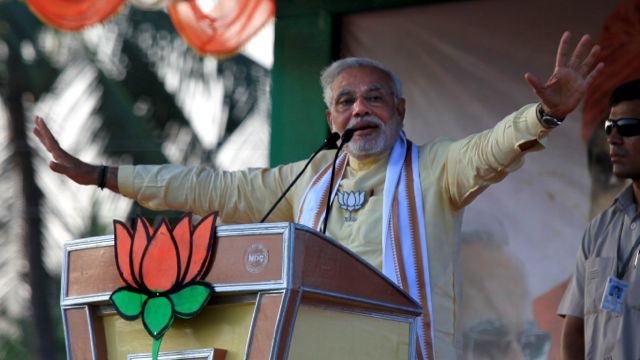SUMMARY
This is AI generated summarization, which may have errors. For context, always refer to the full article.

NEW DELHI, India – Indian prime minister-elect Narendra Modi has invited Pakistan’s premier Nawaz Sharif to his swearing-in next Monday, his party said, in a bold diplomatic statement that he intends to improve strained relations.
Nirmala Sitharaman, spokeswoman for Modi’s Bharatiya Janata Party (BJP), told Agence France-Presse on Wednesday, May 21, all heads of government from the South Asian Association for Regional Cooperation (SAARC) are being sent “invitations to be present at Mr Modi’s swearing in”.
The invitation, yet to officially dispatched to Pakistan or other members of the eight-nation grouping, signals Modi’s intention to tackle India’s most troubled bilateral relationship at a time when Sharif is also keen on talks, analysts say.
“It’s a very important gesture,” said Manoj Joshi, a fellow at the Observer Research Foundation, a New Delhi-based think-tank.
“It definitely shows Modi’s intentions to focus on immediate neighbours and it’s a realistic signal: realism in the sense that unless you have good relations with neighbours you can hardly focus beyond,” he said.
Modi will take the oath as prime minister 10 days after his right-wing Hindu nationalist BJP scored a landslide victory, securing the first majority by a single party in 30 years.
The hardline leader was expected to usher in a more muscular foreign policy, insisting on the campaign trail other countries would respect India only if it showed strong political leadership.
A senior official from India’s foreign ministry told Agence France-Presse it was examining a proposal to welcome foreign heads of governments next Monday, but said invitations had not yet been dispatched.
However, a BJP source said Indian Foreign Secretary Sujatha Singh was writing to the SAARC leaders and they would get the invitations soon.
Hopes for thaw
Sharif, who is himself a centre-right leader, has hailed Modi’s “impressive victory” and many diplomats hope the two men can thaw ties between the nuclear-armed neighbours.
Sharif has cited his working relationship with Atal Bihari Vajpayee, India’s last prime minister under the BJP, as a reason for optimism, according to diplomatic sources.
In 1999, during Sharif’s second term in power, Vajpayee rode a bus to the Pakistani city of Lahore to sign a peace accord and raise hopes of normalised ties.
But three months later, the neighbours embarked on the Kargil conflict in the Himalayan region of Kashmir that almost became a full-fledged war.
India and Pakistan have fought three wars since independence in 1947 and bilateral ties broke down after 2008 attacks by Pakistani gunmen on India’s commercial hub Mumbai in which 166 people were killed.
Relations have warmed slightly under outgoing Prime Minister Manmohan Singh, but still remain frosty amid mutual distrust and regular skirmishes along their disputed Kashmir border.
Singh’s Congress party, which crashed to its worst-ever defeat in the elections, brushed aside political hostility and welcomed the invitation to SAARC leaders.
“It’s the prerogative of the prime minister who he wants to invite,” Congress spokesman Abhishek Manu Singhvi told a news conference.
“We hope this positive initiative will translate into something substantive.”
Modi warned during campaigning that talks could not be held with Pakistan until all violence ceased.
Key issues remain the disputed Kashmir region as well as Islamist militancy inside India, which New Delhi frequently accuses Pakistan of backing.
While Pakistan’s civilian leaders and business community favour closer ties, many ordinary Pakistani revile Modi. He is tainted by 2002 religious riots in his home state of Gujarat that killed 1,000 people, mostly Muslims.
Pakistan’s powerful army is also said by analysts to be wary of closer ties and could act as a brake on any peacemaking attempts.
Talat Masood, a political analyst based in Islamabad, hailed the Indian initiative as a “great gesture” that Pakistan must reciprocate even if the army thinks otherwise.
“There’s nothing to lose in reciprocating it and attending the ceremony. This will give the message Pakistan is genuine about improving relations with India,” Masood, also a retired general, told Agence France-Presse. – Rappler.com
Add a comment
How does this make you feel?
There are no comments yet. Add your comment to start the conversation.